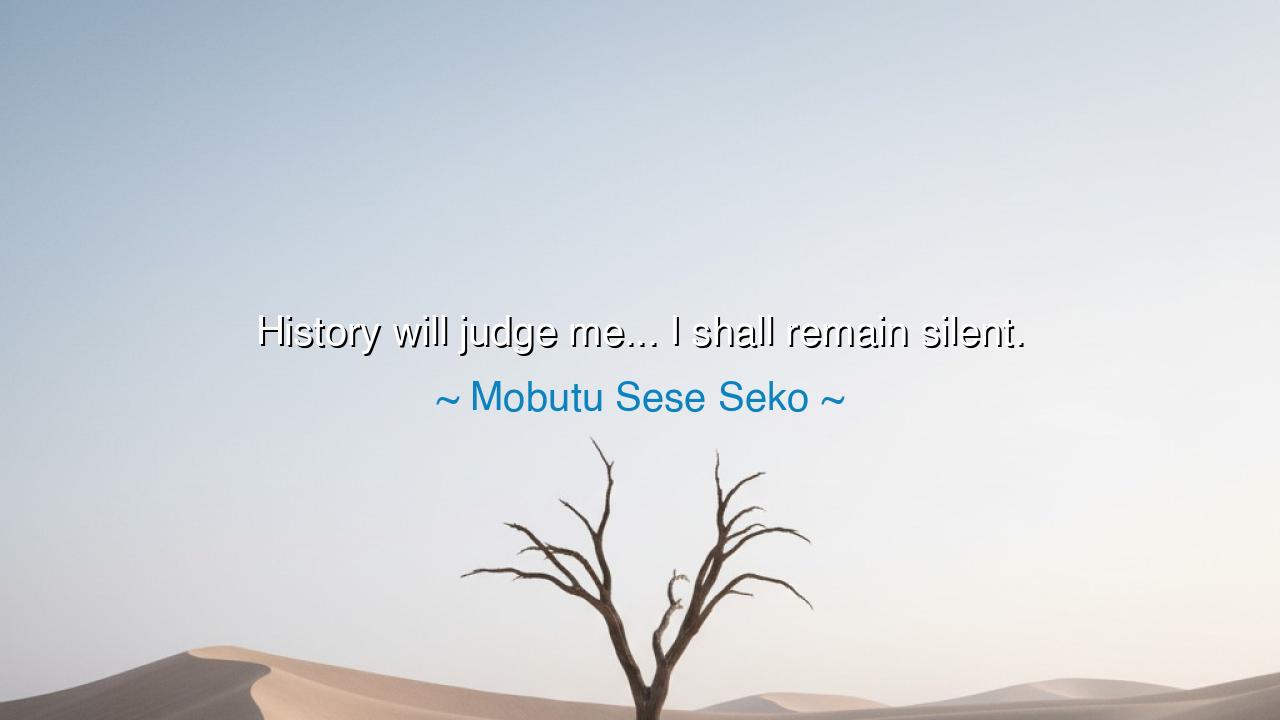
History will judge me... I shall remain silent.






The once-mighty ruler of Zaire, Mobutu Sese Seko, is said to have declared in his twilight years: “History will judge me... I shall remain silent.” These words, spoken by a man who once held absolute power over his nation, carry the weight of pride, resignation, and an unspoken plea for mercy. They are both a confession and a defense — a recognition that no mortal can escape the tribunal of history, and that silence, in the end, may speak louder than the excuses of the fallen. Like a monarch facing the judgment of eternity, Mobutu seemed to understand that the time for justification had passed, and that only the cold gaze of posterity would render its verdict.
The origin of this quote is found in the final years of Mobutu’s life, after decades of rule marked by grandeur, corruption, and contradiction. Rising to power in the 1960s after the turbulent independence of the Congo, Mobutu styled himself as the savior of his nation, adopting the title “the all-powerful warrior who goes from conquest to conquest.” He ruled for over three decades, wrapping his regime in symbols of unity and nationalism while enriching himself beyond measure. When his empire of influence began to crumble under rebellion and the collapse of Cold War alliances, the once-feared leader found himself a fugitive, exiled and dying in foreign lands. It was then, stripped of his throne and surrounded by the silence of defeat, that he uttered his haunting reflection — that history itself would judge, and he would no longer speak in his own defense.
To say “History will judge me” is to acknowledge that no power, no wealth, no throne can outlast the memory of one’s deeds. For kings and conquerors, this truth is as ancient as civilization itself. The Pharaohs of Egypt built monuments to outshine death; emperors carved their victories into stone; yet time reduced their glory to dust, leaving only their choices as witness. Mobutu’s silence, then, is not the silence of wisdom alone — it is the silence of one who realizes that history cannot be bribed or deceived. The same hand that crowns also records, and its ink is indelible. When the end comes, the noise of power fades, and only the voice of history remains.
Consider the story of Napoleon Bonaparte, exiled to the island of Saint Helena after his fall from empire. Like Mobutu, he too once held the destiny of millions in his hands. In his solitude, Napoleon dictated memoirs to justify his life, but even then, he knew that history would judge him, not by his words but by his deeds. Unlike Mobutu, Napoleon could not remain silent — his pride would not allow it. Yet in the centuries that followed, his legacy was written and rewritten by others, shaped by time, not by his own defense. Thus, the conqueror who sought to control the world discovered that no man controls history, and the same truth echoes in Mobutu’s final silence.
There is also a kind of wisdom in silence, when a man ceases to argue with his own past. To speak too much in defense of one’s failures is to cheapen the dignity of repentance. Perhaps Mobutu’s words carried the faint humility of one who had seen the vanity of his empire. After all, he had built cities that bore his name, palaces gilded with wealth, armies sworn to his image — and yet all of it vanished in the wind. The man who once commanded fear came to understand that time is the great equalizer, and that silence, before the weight of truth, is the only honest response.
But there is another meaning in his words, darker and more tragic. “I shall remain silent” can also mean the silence of denial — the refusal to confess or confront one’s own guilt. In this sense, Mobutu’s silence mirrors the silence of many leaders who fall from grace and vanish without apology. It is the silence of pride, of the unwillingness to reckon with the suffering left behind. For history is merciless, but it is also fair — and it is written not only by the victors, but by the people whose pain endures long after empires fade. The silence of the powerful does not erase their deeds; it only deepens the echo of their consequences.
Thus, my children of the present age, let this quote stand as both warning and wisdom. History will judge us all, not by our words but by our actions, not by what we claim, but by what we create and destroy. Speak when your words bring truth; act when your actions bring justice; but when you have erred, learn the courage to face your own history. For silence can be noble when it is born of reflection, but it is cowardice when it hides from responsibility.
And so remember: the throne of history is eternal, and all must one day stand before it. Live, therefore, not for the applause of the present, but for the respect of the future. Let your deeds speak with integrity, so that when the day comes and you, too, must fall silent, you may say not with fear, but with peace: “History will judge me — and I shall not be ashamed.”






AAdministratorAdministrator
Welcome, honored guests. Please leave a comment, we will respond soon